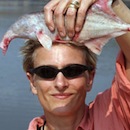Advisory Board and Editors Taxonomy

Melanie L.J. Stiassny
Axelrod Research Curator of Fishes, Division of Vertebrate Zoology, and Professor, Richard Gilder Graduate School at the American Museum of Natural History.

J.g.m. Thewissen
Ingalls-Brown endowed Professor of Anatomy at Northeast Ohio Medical University. Author of 'The Walking Whales.' Associate Editor of PeerJ, the Zoological Journal of the Linnean Society and the Journal of the Palaeontological Society of India. Co-Editor of the 'Encyclopedia of Marine Mammals,' and 'The Bowhead Whale, Balaena mysticetus, Biology and Human Interactions.'

Cristiane C Thompson
Professor of Genetics of the Institute of Biology of the Federal University of Rio de Janeiro (UFRJ). Our research group focuses mainly on marine microbiology.

Fabiano Thompson
Oceanographer and Professor of Marine Biology of the Institute of Biology and SAGE-COPPE of the Federal University of Rio de Janeiro (UFRJ). Our research group focuses mainly on marine microbiology.

Emanuel Tschopp
Emanuel Tschopp received his MSc in paleontology 2008 at University of Zurich, Switzerland, and his PhD in 2010 at Faculdade de Ciência e Tecnologia of the Universidade Nova de Lisboa, Portugal, under the supervision of Prof. Octávio Mateus. After postdocs in Portugal, Italy, and the USA, he is now a Humboldt Fellow at University of Hamburg. His main research interests are the dinosaur and lizard systematics and phylogeny with a focus on sauropod dinosaurs from the Upper Jurassic Morrison Formation in the USA, and extant and extinct lacertid lizards. Furthermore, he is an actively working on improving the methodology of phylogenetic analysis based on phenotypic data, and developing approaches to quantify intraspecific variability to use in species delimitation.

Balu Alagar Venmathi Maran
Dr. Balu Alagar Venmathi Maran, Ph.D.
Associate Professor, Graduate School of Integrated Science and Technology, Nagasaki University, Japan
Dr. Balu Alagar Venmathi Maran is an Associate Professor at the Graduate School of Integrated Science and Technology, Nagasaki University, Japan. He previously served as an Associate Professor at the Borneo Marine Research Institute, Universiti Malaysia Sabah (UMS), Malaysia, from 2017 to 2023. Before that, he was a Research Professor at Chonnam National University, Pukyong National University, and Kyungpook National University, South Korea (2015–2017) and a Scientist at the Korean Institute of Ocean Science and Technology, Busan, South Korea (2011–2015).
Dr. Venmathi Maran earned his Ph.D. in Marine Biology from Hiroshima University, Japan, and has 25 years of research experience in marine science and aquaculture. His expertise includes the taxonomy of marine fish parasites and the application of natural products for parasite control in aquaculture. Additionally, his research focuses on jellyfish biodiversity, harmful jellyfish toxins, and the potential of jellyfish collagen in cosmetics.
Currently, he is engaged in a marine science and technology project utilizing artificial intelligence in biological imaging. His significant contributions to research and innovation have been recognized with multiple awards and gold medals from UMS.
Dr. Venmathi Maran has authored over 100 research articles, 10 book chapters, and has edited three books published by Springer and UMS Press. As the principal investigator of several research projects, including an international project on marine biodiversity, he plays a key role in advancing marine research.
Additionally, he serves as an Academic Editor for PeerJ (Q1), International Journal of Microbiology (Wiley), and Diversity (MDPI) as a Guest Editor, along with several other scientific journals.

Olja Vidjak
Dr. Olja Vidjak's educational background includes an MSc in Oceanology (1998) and a PhD in Biology (2004) from the University of Zagreb, Croatia. She is a researcher at the Institute of Oceanography and Fisheries (Croatia), with primary specialization in the ecology and taxonomy of marine zooplankton. Her research interests include the spread and management of aquatic non-native species and marine biodiversity conservation.

Khor Waiho
Researcher at the Institute of Tropical Aquaculture and Fisheries, Universiti Malaysia Terengganu. Dr. Khor Waiho obtained his Ph.D. in Aquaculture from Universiti Malaysia Terengganu (2016) and completed a 2-year postdoctoral (Biology, 2017-2019) at Shantou University, China. His current research focus includes the impact of climate change on crustacean growth and reproductive biology, population biology and fishery, and the aquaculture of economically important crustacean species.

Dapeng Wang
Dr Dapeng Wang is a Senior Bioinformatician in Integrative Analysis at the COMBAT consortium at the University of Oxford using multi-omics techniques in combination with the cutting-edge bioinformatic approaches and statistical methods to explore the pathogenesis of COVID-19 and stratification of patients as well as inform the treatment strategy based on genomics information.
Dr Wang received a bachelor’s degree in mathematics from the Shandong University in 2006 and obtained a PhD degree in bioinformatics from the Beijing Institute of Genomics of the Chinese Academy of Sciences in 2011. After his graduation, he continued to conduct research at the same institute from 2011 to 2014 and afterwards moved to the UK to take up various roles at the Cancer Institute at the University College London (2014-2016), the Department of Plant Sciences at the University of Oxford (2016-2018) and the LeedsOmics at the University of Leeds (2018-2020).

Darren F Ward
I am an entomologist whose research interests are focused on the threats of invasive insects, the diversity of parasitoid communities, and the utilisation of data from natural history collections in ecological research.

Mathew J Wedel
I am a vertebrate paleontologist, and my main areas of interest are sauropod dinosaurs and the evolution of pneumatic (air-filled) bones in dinosaurs and birds. I'm also interested in the evolution of heads and necks in vertebrates, and in the nervous systems of very large animals. I've been fortunate to coauthor three papers naming new dinosaurs: the sauropods Sauroposeidon (2000) and Brontomerus (2011), and the early horned dinosaur Aquilops (2014). I am currently an Associate Professor at Western University of Health Sciences in Pomona, California, where I teach gross anatomy. In 2016 my book "The Sauropod Dinosaurs: Life in the Age of Giants", with artist and lead author Mark Hallett, was published by Johns Hopkins University Press.
In my spare time I enjoy stargazing, and I write the monthly Binocular Highlights column and the occasional feature article for Sky & Telescope magazine.

Michael Wink
Prof. Dr. Michael Wink is Professor of Biology and Director at the Institute of Pharmacy and Molecular Biotechnology of Heidelberg University; Head of Biology Department (1989-2019). Senior professor since 2019. Editor of Diversity, Biotechnology Journal and Journal of Ornithology. Member of several editorial boards and scientific societies. Author of over 20 books and over 900 original peer-reviewed publications.

